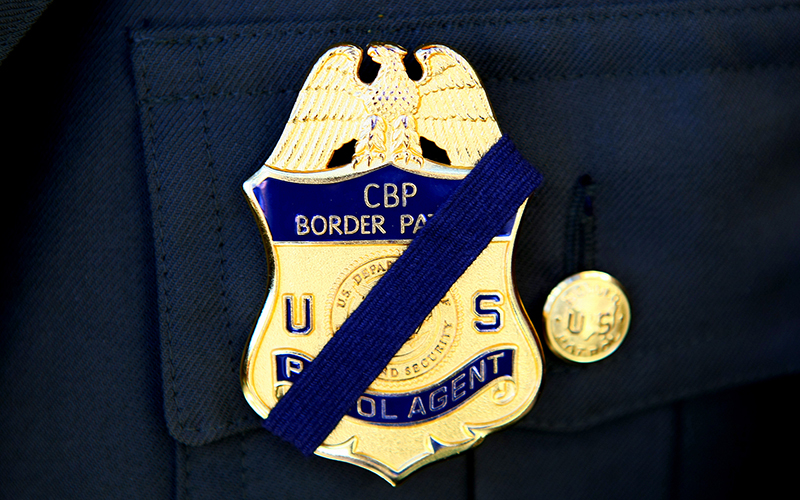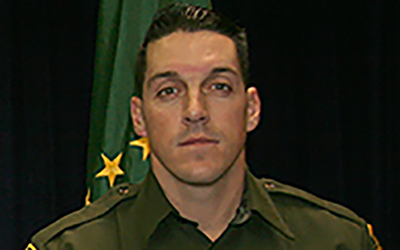
A Border Patrol badge honors Agent Brian Terry, who was killed in a shootout with smugglers near Rio Rico in December 2010. A federal appeals court Friday upheld the convictions of two men in his murder. (Photo by Bill Morrow/Creative Commons)
WASHINGTON – A federal appeals court Friday affirmed the convictions of two Mexican men in the 2010 murder of Border Patrol Agent Brian Terry, who was killed in a gun battle near Rio Rico.
A three-judge panel of the 9th U.S. Circuit Court of Appeals rejected arguments by Ivan Soto-Barraza and Jesus Lionel Sanchez-Meza that they were improperly extradited from Mexico to face trial in Terry’s death and that jury instructions in the case were incorrect.
The two had confessed in Mexico that they were part of a “rip crew” – armed gangs who preyed on others smuggling drugs across the border – when they were confronted in an area called the Mesquite Seep by a team of Border Patrol agents and opened fire, killing Terry.
“Given that the defendants admitted that they entered Mesquite Seep to search for marijuana smugglers and to rob them at gunpoint, and given their preparations for doing so, a reasonable jury could conclude that defendants would have carried out the crime once the opportunity presented itself and failed to do so only because they were interrupted,” by Border Patrol agents, said the opinion by Circuit Judge Sandra Ikuta.
Neither attorneys for the men nor for the government responded to calls Friday seeking comment on the ruling.
In December 2010, Terry was one of six agents on a 48-hour patrol in the Mesquite Seep of Santa Cruz County looking for rip crews. At night toward the end of their patrol, the agents were alerted that men were approaching and, using heat-sensing equipment, they were able to spot the men – at least two of whom had weapons at the ready.
Some of the men ran away when the officers shouted “policia,” but others ran toward the officers and raised their weapons, according to court documents. An agent fired non-lethal rounds at the rip crew while ordering them to get down, but when agents saw muzzle flashes coming from the wash they returned fire.
Terry was hit during the gun battle in the area, which was accessible only by ATV, and later died from his wound.

Border Patrol Agent Brian Terry did two tours in Iraq as a Marine before joining the border agency, where he was killed while patrolling in December 2010. (Photo courtesy Customs and Border Protection)
In the aftermath of the shooting it was determined that one of the guns used by the rip crew had been allowed to “walk” under a Bureau of Alcohol, Tobacco and Firearms investigation called Operation Fast and Furious.
Under that multiyear probe, ATF agents allowed small-time straw purchasers of guns in Arizona to “walk,” in hopes that it would lead agents to drug cartel members. But the ATF ultimately lost track of thousands of those guns – one of which ended up in the Mesquite Seep.
It was never determined if that gun fired the shot that killed Terry, but his death became a focal point in years of congressional hearings and investigations of the failed operation.
Investigators also found backpacks and weapons at the site of the shooting with fingerprints and DNA that linked them to Soto-Barraza and Sanchez-Meza. A grand jury indicted the two men, and four others, on nine counts, ranging from murder to assault and weapons charges.
Sanchez-Meza was arrested 18 months after the shooting and confessed to entering Arizona from Sonora, getting an assault rifle from a hidden cache and heading out to rob smugglers of their drugs before encountering the team that included Terry.
Soto-Barraza was arrested a year later and confessed to the same facts as Sanchez-Meza.
The two men were extradited and, after a seven-day trial in September 2015, were convicted of all counts in federal district court. They were sentenced to life in the murder of Terry and a total of 30 years, concurrent, on the other charges.
On appeal, they argued that the extradition was flawed because the U.S. charges do not have identical charges under Mexican law.
Ikuta flatly rejected their claim.
“Their arguments fail,” she wrote, noting that the extradition treaty between the U.S. and Mexico does not require crimes to be identical and that, in any event, Mexico “stated that extradition for these charges conformed to the treaty’s terms.”